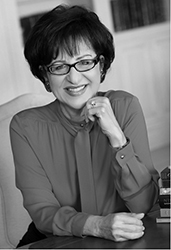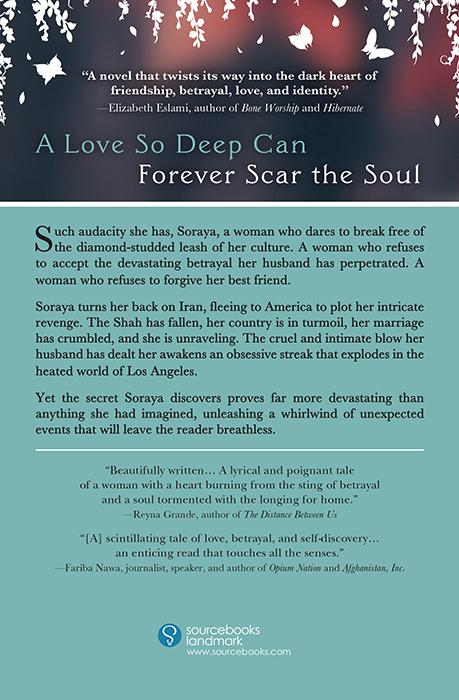Scent of Butterflies (26 page)
Read Scent of Butterflies Online
Authors: Dora Levy Mossanen

Dora:
The superstition and religious beliefs influencing my protagonists are inspired by the colorful characters of my extended familyâgrandmother, aunts, cousinsâand by a culture rich in legend and superstition. My grandmother sometimes used blessings and curses comprised of a mixture of Hebrew, Farsi, and even French words that were completely incomprehensible to me as a child. As an example, she hated storms and cursed them as “
Tifouneh Noar
.” It took me years to realize that she combined the words
toufan
, storm in Farsi; the Biblical Noah; and
noir
, black in French, to come up with “Noah's black storm,” to curse a detested deluge of rain.
14.
A unique aspect of the religious interplay in this novel is that you focus on the lives of Jews living in Iran. Describe for us what it was like working to tell a story through the lens of a Jewish Persian people living under the laws of post-revolution Iranian Islam.
Dora:
Although I was lucky enough to get out of Iran in time, I have been closely following the plight of the few remaining Iranian Jews who were too old or poor to leave the country. It is unfortunate that during periods of political turmoil Jews become scapegoats, and the Islamic revolution was no exception. The remaining Jewish community, who had enjoyed a short period of relative reprieve during the reign of Mohammad Reza Shah, sensing the tide of change, realized that it was prudent to show their support to the incoming regime, no matter their personal sentiments.
I can't think of a better example to demonstrate this forced show of solidarity than referring to a photograph in
Esther's Children: A Portrait of Iranian Jews
, edited by Houman Sarshar. This is an important book I highly recommend. The caption below the photograph says: “Chief Rabbi Yedidia Shofet (far right) and his son Rab David Shofet (center) participating in the general demonstrations leading up to the Islamic Revolution in Iran. Tehran, 1979.” From my vantage as an Iranian American Jew, enjoying the freedoms America has afforded me, the sad, somber, and I'm certain fearful
expressions of the rabbi and his son in the photograph is both enraging and saddening.
15.
The novel ends on a somewhat surprising note. What kind of endings are your favorite to write, and what led you to avoid a “neat” ending for this novel? Did you know early on in your writing process how the novel would end?
Dora:
I never know the ending of my novels until I've gone through many drafts and have moved events and chapters around to fit the story. I've often come to the end, when I'd realize that the beginning of the novel is actually the ending. It is also very common for me to go back after I believe I have the ending and cut the last chapter because I'd arrived at the ending earlier than I realized. I don't like “neat” endings because that robs the reader of the gift of imagination, where the reader is allowed to imagine how the lives of the characters will unfold after the last page, which to me is not the end, but another beginning.
My first thanks goes to my dear editor, Shana Drehs, who guided, advised, and inspired me with great wisdom and an astute sense of style.
Heather Hall, Elizabeth Pehlke, Angela Cardoz, Nicole Komasinski, Adrienne Krogh, Diane Dannenfeldt, and Sabrina Baskey-East, my conscientious team at Sourcebooks, continue to be a blessing. Your additions, subtractions, and suggestions have elevated this novel.
Many thanks, as always, to Dominique Raccah, the Grand Lady herself, who is always there to open doors and smooth the way.
Anna Ghosh, your patience and perseverance paid off. Thank you.
Thank you, Marcela Landres, for being such a steadfast and believing partner in the tumultuous journey this novel has endured.
My gratitude goes to Maureen Connell, Joan Goldsmith Gurfield, Leslie Monsour, Paula Shtrum, and Alexandra Kivowitz, my talented team of writer friends and supporters, whose invaluable comments and endless well of imagination have enriched this novel.
Every step of the way, from inception to publicationâI've lost count of the years, fifteen or sixteen in allâI depended on the encouragement and support of my family, friends, and colleagues, who helped bring this most personal of all my novels to life.
A million thanks to my husband, Nader, who is always there to listen, calm, cheer on, and encourage, as well as lend his support in a million loving and much appreciated ways. Carolyn, Negin, David, Leila, Adam, Hannah, and Macabee, words cannot describe my love for you. You continue to provide me with a much-needed and appreciated sanctuary, a place to regain my spiritual and emotional balance when the need arises. Thank you.
My deep gratitude goes to my mother, Parvin, the unwavering matriarch of our clan, and to Ora, Nora, David, Solomon, and Laura, my biggest fans, who enrich every aspect of my life. My sister, Laura Merage, an incomparable artist in her own right, supplied me with invaluable details about the process of photography. Any errors that might have persisted, despite careful attention, are purely mine.
Jonathan Kirsch and Ann Kirsch, I am grateful for your wisdom, friendship, and guidance. John Schatzel, Lita Weissman, Aurick Canete, Jon Evans, Alison Reid, and Linda Friedman, thank you for caring in these times of change and for keeping our books alive on your shelves.

christine marie photography
Dora Levy Mossanen was born in Israel and moved to Iran when she was nine. At the onset of the Islamic revolution, she and her family were forced to leave Iran and settle in Los Angeles. She has a bachelor's degree in English Literature from the University of CaliforniaâLos Angeles and a master's in professional writing from the University of Southern California.
Dora is the bestselling author of the widely acclaimed novels
Harem
,
Courtesan
, and
The Last Romanov
, translated into numerous languages. She is the recipient of the prestigious San Diego Editors' Choice Award and has been featured in various publications and media outlets, including
Sh'ma
,
Los Angeles Times
, KCRW, Radio Iran, Radio Russia, and numerous television programs. In 2010, Dora was accepted as contributor to the
Bread Loaf Writers' Conference
.
She blogs for the
Huffington Post
and reviews fiction for the
Jewish Journal
. She is working on
The Visionary
, her fifth novel.
